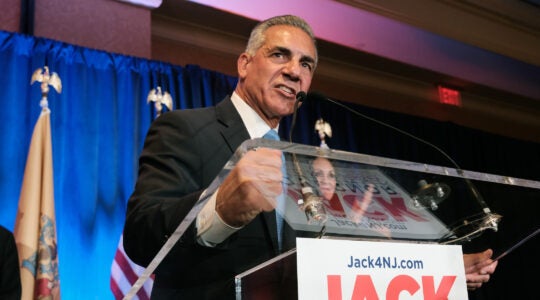WASHINGTON (JTA) – Charles Vanik, the congressman whose name graces legislation that helped free thousands of Soviet Jews, brought liberal civil rights luster to the hard-edged Cold War battle for human rights.
A Democratic member of the Ohio delegation to the U.S. House of Representatives from 1955 to 1981, Vanik died Aug. 29 in Florida. He was 94.
Vanil joined U.S. Sen. Henry “Scoop” Jackson (D-Wash.) in authoring the historic 1974 Jackson-Vanik amendment to the Trade Reform bill that stipulated free emigration markers in order for the Soviet Union to qualify for favored-trade status.
Leaders of the movement to free Soviet Jews say the amendment was critical to allowing thousands of Jews out of the Soviet Union.
Natan Sharansky, the Israeli leader and former prisoner of the Soviet Gulag, cites the legislation as a hallmark of how governments should approach human rights abuses.
Vanik’s commitment came not just from his lifelong closeness to Jews in his native Cleveland, but to his impassioned support for civil rights.
In 1968 he quit his safe, heavily Democratic seat so Louis Stokes could run and win to become the first black congressman elected from Ohio. The same year Vanik challenged and defeated a popular incumbent Republican in the neighboring district.
“He was one of the real liberals in the Congress, a leader in passage of social legislation,” Stokes, now retired, told The Associated Press.
Vanik’s liberal ethos was key to understanding his commitment to Soviet Jewry, said Malcolm Hoenlein, the executive vice-chairman of the Conference of Presidents of Major American Jewish Organizations.
“For him it was a matter of principle, values, a commitment to justice and freedom,” said Hoenlein, who as head of the New York Council on Soviet Jewry worked with Vanik. “It wasn’t a Cold War strategy.”
Vanik was praised as well in a statement from Ed Robin, the chairman of NCSJ: Advocates on behalf of Jews in Russia, Ukraine, the Baltic States and Eurasia. Vanik had worked closely with NCSJ in its former incarnation as the National Council on Soviet Jewry.
“The entire NCSJ family is saddened by the loss of a legislative giant who, with great vision and compassion, authored legislation that changed the course of how the United States confronted the forces of oppression,” Robin said.
Following Vanik’s death, Democrats were celebrating a life they said was devoted to bettering lives in the United States and beyond.
“We are blessed to have known him and worked with him over the years to make both our country and the world a better place,” said Howard Dean, the Democratic National Committee chairman. “Literally tens of thousands of Soviet Jews owe their freedom to Rep. Vanik and Sen. Jackson, who together created legislation that required the United States to link human rights records with special trade privileges.”
Ira Forman, the executive director of the National Jewish Democratic Council, called Vanik “a strong friend to the Jewish community who gave his heart and soul to the cause of Soviet Jewry.”
Vanik’s appeal crossed party lines, said William Daroff, the Washington director of the United Jewish Communities and a former Republican lobbyist.
“When I was a young kid in Cleveland just getting started in politics, Charlie Vanik was my congressman. I always looked up to him as a senior statesman and a man of virtue,” Daroff told JTA. “He was an inspiration to many young Jewish activists for literally saving the lives of tens of thousands of Soviet Jews, who owe their survival to men like Charlie Vanik.”
Memories of Vanik have been overshadowed in recent years by those of Jackson, who died in 1983. Jackson was the hard-nosed cold warrior and one-time presidential candidate who is credited – or blamed – for outlining the precepts of foreign interventionism that underlie the neo-conservatism now guiding the Bush administration’s foreign policy.
Yet Vanik’s role was no less critical, according to those who knew him.
“Both of them were righteous gentiles,” said Mark Talisman, Vanik’s chief of staff and a founder of Project Judaica, a foundation that preserves Jewish heritage items. “Both as Christians could have lived a happy life not doing any of this.”
Vanik, the son and grandson of Czech-descended butchers, grew close to Cleveland’s Jewish community just out of college in the 1930s when his first job as a lawyer was working to settle Jewish refugees from Nazi Europe.
The stories he encountered in that role, the friendships he forged and his deep Roman Catholic faith guided him for the rest of his life. Talisman said that when the United States joined the war against the Axis powers, Vanik left a promising career as a state senator to enlist.
Curiosity drew Vanik to the Soviet Union around 1972, said Talisman, who by then was working for the congressman. In the USSR, Vanik, known stateside for his trademark black bowties, sported a biker’s leather jacket, standing out as an American.
Arriving in Moscow, Vanik encountered Jewish protesters who were just beginning to feel the brunt of discriminatory taxes aimed at squelching the emerging Jewish free emigration movement.
“He came back and wanted a solution for this terrible thing,” recalled Talisman, who is also a founding vice-chairman of the U.S. Holocaust Memorial Museum.
Vanik and Talisman worked closely with Jackson and Richard Perle, then a staffer for the senator and later one of the architects of Bush’s Iraq war policy.
The quartet immediately faced resistance, chiefly from the business community seeking to make inroads into the USSR’s vast markets, but also from the Nixon administration and even from some in the Jewish community who feared using trade as a weapon.
President Nixon and his secretary of state, Henry Kissinger, already disliked Vanik – he was among the first Democrats to introduce articles of impeachment. Talisman said he felt the pressure close to home, where leading members of the Cleveland Jewish community – under pressure, he believes from Kissinger, asked him to influence Vanik to suspend the vote.
In the end, the measure passed overwhelmingly and was signed into law by President Ford.
Vanik was appalled by recent efforts to repeal Jackson-Vanik spurred by business interests who argue that it is no longer needed following the collapse of the Soviet Union.
“He felt there should no repeal of this amendment, it’s in the toolbox and should remain there,” said Talisman, who remained close to Vanik until his death. “He felt you didn’t need it now, but if were not there and you did need it, God help you.”
JTA has documented Jewish history in real-time for over a century. Keep our journalism strong by joining us in supporting independent, award-winning reporting.





